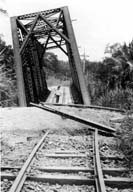
|
Image-B2601
Rio Bananito rail bridge: cast iron caisson rotated inwards, but was still in contact with support block (south abutment)
|
|
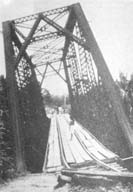
|
Image-B2602
Railway bridge over the Rio Bananito tipped due to caissons being pushed out from under bridge seatings.
|
|
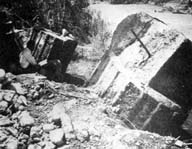
|
Image-B2603
Caissons beneath the Rio Bananito railway bridge were pushed laterally and tilted by as much as 5.7 meters (at the top) and inclined by as much as 37 degrees.
|
|
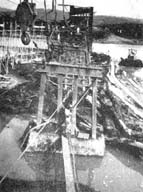
|
Image-B2604
Piers for Rio Estrella railway bridge tilted during the earthquake and were later uprighted. In this photo, they were still out of alignment and no longer equally spaced.
|
|
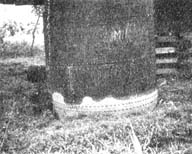
|
Image-B2605
Caisson beneath Rio Matina Bridge that tilted by 4.5 degrees due to lateral ground displacement. Light ring at base shows amount of ground settlement. (After EERI, 1991)
|
|
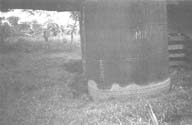
|
Image-B2606
Rio Matina rail bridge: tilting of a caisson.
|
|
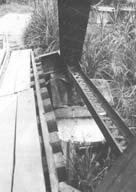
|
Image-B2607
Rio Bananito rail bridge: cast iron caisson rotated inwards with support blocks fallen behind (north abutment).
|
|
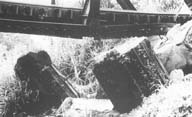
|
Image-B2608
Rio Bananito rail bridge: partial collapse, truss leaning downstream toward the west.
|
|
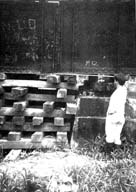
|
Image-B2609
Temporary shoring of girders over the Rio Matina flood plain. The location of the pier with respect to the old connection on the girder shows horizontal displacement of 1.17 meters and settlement of 0.12 m.
|
|
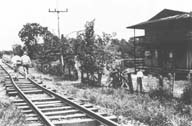
|
Image-B2610
View of the railroad track looking towards the bridge. Railroad ties were displaced with a repeatable pattern along their length. Sand boils were observed in front of the building to the right.
|
|
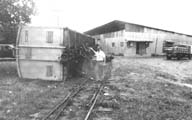
|
Image-B2611
The intensity of strong motion was indicated by the many examples of overturned railroad cars at banana packing plants in Costa Rica and Panama.
|
|













